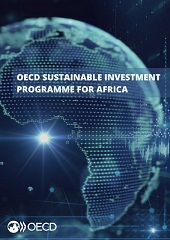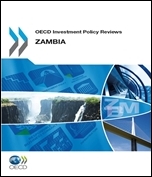Investment policy
OECD Sustainable Investment Programme for Africa
OECD Investment Policy ReviewsThe Initiative works with African countries to strengthen their business climate by undertaking comprehensive reviews of investment policy with a view to enacting policy reforms which attract more and better investment.
|
Investment in Africa's agricultureMany African countries are attractive destinations for agricultural investment. The Initiative supports efforts by African governments to strengthen their capacities to design policies that will enhance the development returns of more and better investment in the sector. In this context, Burkina Faso undertook a sector review of their agricultural policies based on the Policy Framework for Investment in Agriculture. This review was designed to assist the government in developing an integrated policy framework to benefit from investment in agriculture. West Africa - promoting responsible investment in agriculture |
||
Investment in Africa's infrastructureAid for Investment in Infrastructure This project focused on how development aid can catalyse investment. A report released in May 2012 analyses how aid can leverage private investment in Africa’s infrastructure sectors. This report was developed in partnership with the Development Assistance Committee. Addressing policy impediments to private investment in African infrastructure As a first step to publishing a policy paper proposing actionable reforms for African governments to help increase private investment in infrastructure, in July 2014, the OECD and the AfDB organised a seminar to investigate how changes made in key policy areas can help generate more and better private investment in the sector. See also Policy impediments to infrastructure investment in Southern Africa.
|
Investment policy in Southern AfricaThe unlocking investment potential in Southern Africa project supports Southern African governments to identify and implement concrete policy reforms that strengthen the investment climate. Regional Investment Policy Framework for the Southern African Development Community (SADC) Working with SADC member states, the Initiative is developing the SADC Regional Investment Policy Framework which aims to facilitate regional co-ordination and exploit economies of scale in improving investment frameworks and policies. The framework is due to be finalised in Q4 2015. |
||
Public-private partnerships in TunisiaPublic-private partnerships (PPPs) can play an important role for inclusive and sustainable growth in Tunisia. Towards this end the Government of Tunisia is working with the OECD to operationalise the country's forthcoming PPP law, designed to promote transparency, efficiency and effectiveness of public spending, and to help the government of Tunisia meet its public policy objectives. |
Economic diversification in Africa: A review of selected countries, UN-OECD-NEPAD (2011)
This study recommends further diversification of African economies to reduce reliance on natural resource revenues and encourage sustainable growth in other strategic sectors such as agriculture, tourism and telecommunications. It presents case studies of 5 African countries - Angola, Benin, Kenya, South Africa and Tunisia.
|
Related Documents

